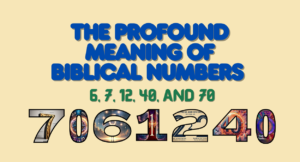Divine Numerological Truths: Unlocking the Secrets of Biblical Numbers (Part 2 – From Number 6 Onward) NO. 6 To 20
Numbers in the Bible are far more than mere figures; they hold divine significance, deep spiritual meanings, and hidden messages from God. Biblical numerology reveals how numbers are intricately woven into scripture, guiding us toward understanding divine truths and universal eternity.
In Part 1, we explored the profound meanings of Numbers 1 to 5, uncovering their spiritual symbolism and how they shape biblical prophecy, divine order, and creation. Now, in Part 2, we continue our journey from Number 6 onward, delving deeper into the sacred patterns and messages embedded within scripture.
What does the number 6 represent in biblical numerology? Why is 7 often considered the number of divine perfection? How do numbers like 12, 40, and 70 hold prophetic significance? Join us as we decode these numerical mysteries and discover their impact on faith, life, and eternity.
Let’s dive in!
Biblical Numerology: Understanding the Significance of Numbers in Scripture, NO. 6 To 20
Numbers in the Bible often carry deep symbolic meanings that reveal divine truths and God’s plan for humanity. Below is an exploration of significant biblical numbers and their spiritual implications.
6 – The Number of Man & Imperfection
The number 6 represents humanity, labor, and imperfection. The man was created on the sixth day (Genesis 1:26-31), and humans are commanded to work for six days before resting on the seventh. In Revelation, 666 is the number of the Beast, symbolizing man’s sinful nature and rebellion against God (Revelation 13:18). It also represents incomplete efforts apart from divine perfection.
7 – The Number of Completion & Perfection
Seven signifies spiritual completion and divine perfection. God created the world in six days and rested on the seventh (Genesis 2:2-3), establishing the Sabbath as a holy day. The Bible frequently emphasizes seven, such as the seven churches, seven seals, seven trumpets, and seven spirits of God in Revelation. It represents God’s fullness and covenant with humanity.
8 – The Number of New Beginnings and Resurrection
The number 8 symbolizes new beginnings, regeneration, and resurrection. Since God’s creation was completed in seven days, the eighth day represents the start of a new cycle. Jesus was resurrected on the first day of a new week, the eighth day, signifying renewal and eternal hope (Luke 24:1).
9 – The Number of Fruitfulness and Divine Completion
Nine is associated with spiritual fruitfulness and completeness. It symbolizes the fruits of the Holy Spirit as listed in Galatians 5:22-23—love, joy, peace, patience, kindness, goodness, faithfulness, gentleness, and self-control. It reflects God’s perfect work in transforming a believer’s life.
10 – The Number of Law, Order, and Responsibility
The number 10 represents God’s law and human responsibility. The Ten Commandments (Exodus 20) serve as the foundation for moral and spiritual law. The number also signifies completeness in God’s order, as seen in tithing—a tenth given back to God as an act of obedience and worship (Leviticus 27:30).
11 – The Number of Transition and Disorder
The number 11 often symbolizes transition, incompleteness, and disorder. It represents a period of waiting or imbalance before divine fulfillment. The disciples were 11 in number after Judas’ betrayal until God completed their group with the addition of Matthias (Acts 1:26).
12 – The Number of God’s Government and Divine Authority
Twelve signifies God’s governance, authority, and divine order. It is seen in the 12 tribes of Israel, the 12 apostles of Jesus, and the 12 gates of the New Jerusalem (Revelation 21:12). It symbolizes God’s perfect plan for His people and His eternal kingdom.
Divine Numerological Truths According to the Bible
13 – The Number of Rebellion & Apostasy
Thirteen is often linked to rebellion, sin, and lawlessness. In Genesis 14:4, kings rebelled in the 13th year. Nimrod, the first known tyrant, is associated with this number. Judas Iscariot, the disciple who betrayed Jesus, is linked to 13, reinforcing its biblical symbolism of betrayal and disorder.
14 – The Number of Deliverance & Salvation
Fourteen symbolizes salvation, deliverance, and divine intervention. The genealogy of Jesus in Matthew 1:17 is divided into three sets of 14 generations, reflecting God’s redemption plan. The Passover lamb was sacrificed on the 14th day of Nisan (Exodus 12:6), marking the Israelites’ escape from Egypt.
15 – The Number of Rest & Mercy
Fifteen signifies God’s grace, rest, and divine protection. Several Jewish festivals begin on the 15th day of the Hebrew month, such as Passover and the Feast of Tabernacles. In Hebrew, “Yah” (יה), a short form of God’s name, has a numerical value of 15, reflecting divine favor and peace.
16 – The Number of Love & Covenant
Sixteen is associated with God’s love, relationships, and promises. In 1 Corinthians 13, which describes love, 16 attributes of love are mentioned. The 16th time Noah’s name appears in the Bible, God establishes a covenant with him (Genesis 6:18).
17 – The Number of Victory & Resurrection
Seventeen represents victory over trials and resurrection power. Jesus was resurrected on the 17th of Nisan, symbolizing triumph over death. In Genesis 7:11, the flood began on the 17th, bringing divine judgment but also renewal. Joseph was 17 years old when he was sold into slavery (Genesis 37:2), later leading to his rise in Egypt and the salvation of his family.
18 – The Number of Life (Chai) & Blessing
Eighteen is strongly associated with life (Chai – חי) in Hebrew. Many Jewish blessings and prayers are based on multiples of 18, symbolizing prosperity and divine favor. In Luke 13:11-13, Jesus heals a woman crippled for 18 years, reinforcing its meaning of restoration and blessing.
19 – The Number of Faith & Divine Order
Nineteen is connected to faith, God’s judgment, and divine alignment. Israel had 19 kings in the Northern Kingdom, most of whom led the nation into sin. Psalm 19 declares, “The heavens declare the glory of God,” emphasizing the role of faith in recognizing God’s creation.
20 – The Number of Redemption & Expectation
Twenty represents waiting, redemption, and transformation. In Genesis 31:38-41, Jacob waited 20 years to receive his wives and wealth. The biblical age of redemption was 20 years old (Exodus 30:14), marking maturity and responsibility before God.
Conclusion
The numbers in the Bible reveal profound truths about God’s nature, plans, and interaction with humanity. These numbers provide insight into divine order and spiritual significance throughout scripture from creation to redemption.





Pingback: The Profound Meaning of Biblical Numbers: 6, 7, 12, 40, and 70 - Divine Truth Of Numbers